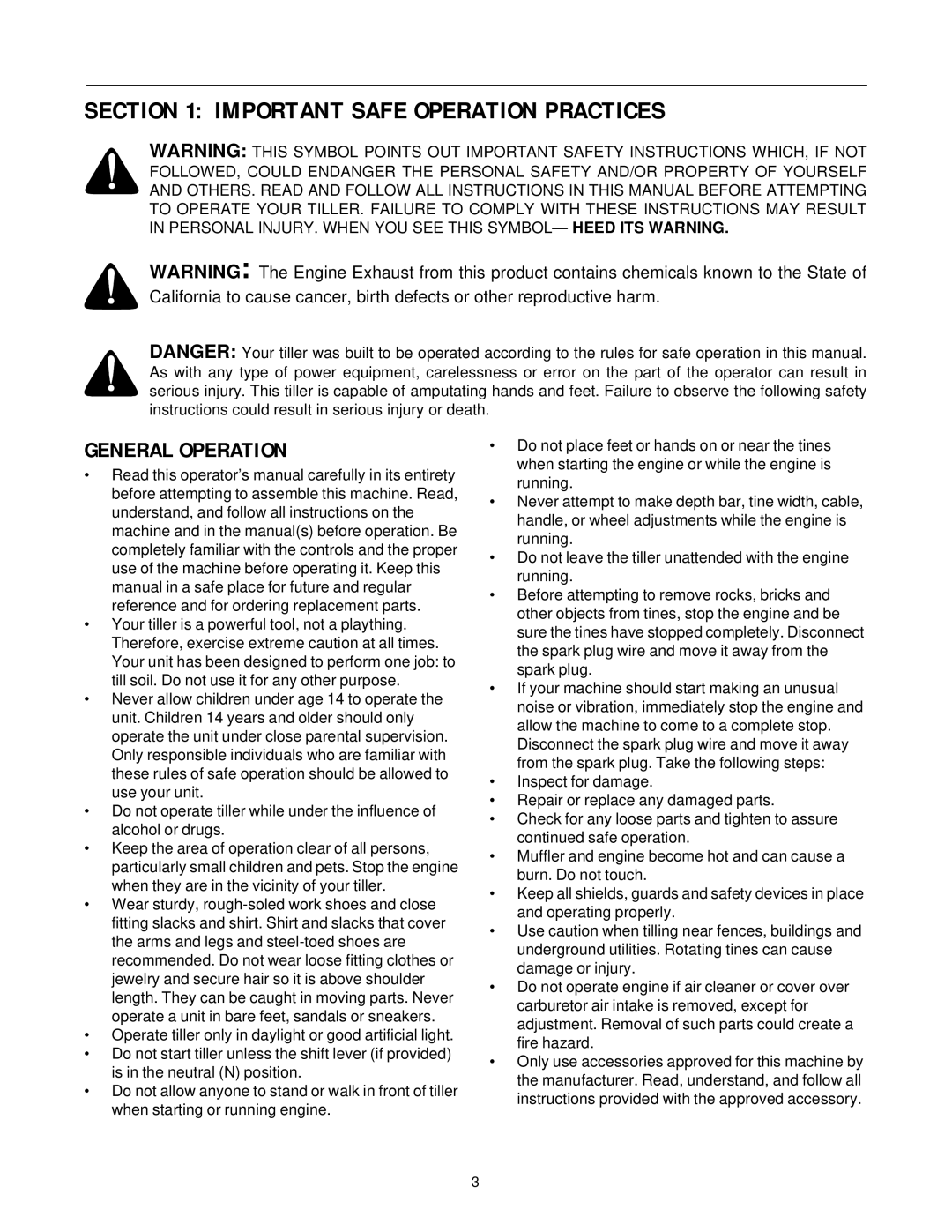
SECTION 1: IMPORTANT SAFE OPERATION PRACTICES
WARNING: THIS SYMBOL POINTS OUT IMPORTANT SAFETY INSTRUCTIONS WHICH, IF NOT FOLLOWED, COULD ENDANGER THE PERSONAL SAFETY AND/OR PROPERTY OF YOURSELF AND OTHERS. READ AND FOLLOW ALL INSTRUCTIONS IN THIS MANUAL BEFORE ATTEMPTING TO OPERATE YOUR TILLER. FAILURE TO COMPLY WITH THESE INSTRUCTIONS MAY RESULT IN PERSONAL INJURY. WHEN YOU SEE THIS SYMBOL— HEED ITS WARNING.
WARNING: The Engine Exhaust from this product contains chemicals known to the State of California to cause cancer, birth defects or other reproductive harm.
DANGER: Your tiller was built to be operated according to the rules for safe operation in this manual. As with any type of power equipment, carelessness or error on the part of the operator can result in serious injury. This tiller is capable of amputating hands and feet. Failure to observe the following safety instructions could result in serious injury or death.
GENERAL OPERATION
•Read this operator’s manual carefully in its entirety before attempting to assemble this machine. Read, understand, and follow all instructions on the machine and in the manual(s) before operation. Be completely familiar with the controls and the proper use of the machine before operating it. Keep this manual in a safe place for future and regular reference and for ordering replacement parts.
•Your tiller is a powerful tool, not a plaything. Therefore, exercise extreme caution at all times. Your unit has been designed to perform one job: to till soil. Do not use it for any other purpose.
•Never allow children under age 14 to operate the unit. Children 14 years and older should only operate the unit under close parental supervision. Only responsible individuals who are familiar with these rules of safe operation should be allowed to use your unit.
•Do not operate tiller while under the influence of alcohol or drugs.
•Keep the area of operation clear of all persons, particularly small children and pets. Stop the engine when they are in the vicinity of your tiller.
•Wear sturdy,
•Operate tiller only in daylight or good artificial light.
•Do not start tiller unless the shift lever (if provided) is in the neutral (N) position.
•Do not allow anyone to stand or walk in front of tiller when starting or running engine.
•Do not place feet or hands on or near the tines when starting the engine or while the engine is running.
•Never attempt to make depth bar, tine width, cable, handle, or wheel adjustments while the engine is running.
•Do not leave the tiller unattended with the engine running.
•Before attempting to remove rocks, bricks and other objects from tines, stop the engine and be sure the tines have stopped completely. Disconnect the spark plug wire and move it away from the spark plug.
•If your machine should start making an unusual noise or vibration, immediately stop the engine and allow the machine to come to a complete stop. Disconnect the spark plug wire and move it away from the spark plug. Take the following steps:
•Inspect for damage.
•Repair or replace any damaged parts.
•Check for any loose parts and tighten to assure continued safe operation.
•Muffler and engine become hot and can cause a burn. Do not touch.
•Keep all shields, guards and safety devices in place and operating properly.
•Use caution when tilling near fences, buildings and underground utilities. Rotating tines can cause damage or injury.
•Do not operate engine if air cleaner or cover over carburetor air intake is removed, except for adjustment. Removal of such parts could create a fire hazard.
•Only use accessories approved for this machine by the manufacturer. Read, understand, and follow all instructions provided with the approved accessory.
3
